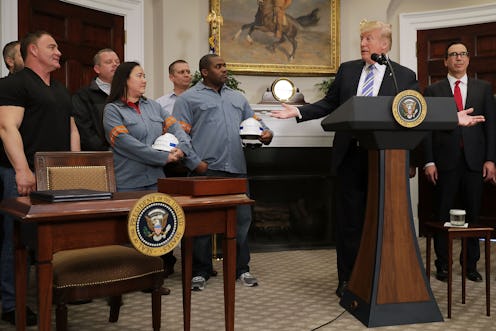News
Trump Tried To Praise A Man By Suggesting His Dad Was Dead & The Video Is SO Awkward

At a White House ceremony Thursday, President Trump signed two declarations imposing heavy tariffs on steel and aluminum. The event featured a speech by the president of a local steelworkers' union, who spoke about the struggles of his father, Herman, in the steel industry. In response, Trump told that steelworker that his father is "looking down and he's very proud of you right now." It was awkward, given that the father in question, in fact, still alive.
"I thank you for the opportunity for what you are doing," Scott Sauritch, the president of United Steelworkers Union local 2227, told Trump at the end of his speech in the Roosevelt Room.
"Your father, Herman, he's looking down and he's very proud of you right now," Trump said to Sauritch upon taking the microphone. "Oh, he's still alive," Sauritch responded.
"Oh, he is?" Trump asked, to awkward laughs. "Well, then he's even more proud."
To the dismay of many elected Republicans, Trump imposed a 25 percent tariff on steel and a 10 percent tariff on aluminum on Thursday. At the ceremony, Trump said that the challenges faced by American manufacturing industries are "an assault on our country," though it was unclear who or what carried out the "assault" in question. Canada and Mexico are exempt from the new tariffs.
Trump's position on trade is one of few that puts him at odds with decades of Republican orthodoxy. When he announced the tariffs, more than 100 House Republicans signed a letter urging him to "reconsider the idea of broad tariffs to avoid unintended negative consequences to the U.S. economy and its workers." Gary Cohn, Trump's chief economic adviser and head of the Council of Economic Advisers, reportedly worked furiously to convince Trump to change his mind, and subsequently resigned from the administration days before the tariffs were implemented.
But Trump has opposed free trade since before he even launched his political career, and was apparently unswayed by those in his party and administration who worked to change his position on the issue. At the ceremony Thursday, Trump said that the tariffs are a matter of "national security."
“Today I’m defending America’s national security by placing tariffs on foreign imports of steel and aluminum,” Trump said. "We have to protect and build our steel and aluminum industries, while at the same time showing great flexibility and cooperation toward those that are really friends of ours."
Trump implemented the tariffs without congressional approval. He was able to do this under Section 232 of the Trade Expansion Act of 1962, which allows a president to impose tariffs by executive order. Congress still has the authority to reverse the decision, but this is unlikely, as it would require a veto-proof majority in both the House of Representatives and the Senate.
That isn't stopping one Republican from trying. Arizona Sen. Jeff Flake announced Thursday that he'll be introducing a bill to reverse the tariffs.
"I will immediately draft and introduce legislation to nullify these tariffs, and I urge my colleagues to pass it before this exercise in protectionism inflicts any more damage on the economy," Flake said in a statement. “These so-called ‘flexible tariffs’ are a marriage of two lethal poisons to economic growth — protectionism and uncertainty. Trade wars are not won, they are only lost. Congress cannot be complicit as the administration courts economic disaster."
At the signing ceremony Thursday, a steelworker from Pennsylvania thanked Trump, explaining that "these tariffs definitely have an impact." The nature of that impact may be different from what the president believes, however. A report by the Brookings Institute identified the 10 states whose economies are most reliant on steel and aluminum imports, and thus stand to lose the most from the new tariffs. Eight of those states voted for Trump.